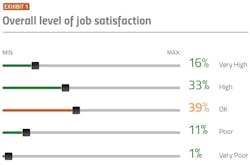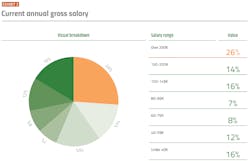I probably shouldn’t have been surprised when this year’s batch of survey responses came with over 50 faked entries, submitted in an attempt to win the gift card incentives. We caught the glitch, fortunately, but not before it required a few hours of rework, manual data cleanup and some choice words from our editorial staff.
But ultimately it became a good metaphor for the emotional dumpster dive we’ve all had to undertake over the last 12+ months — if you want to get to the good stuff, you’re probably going to have to get your hands dirty.
The pharma industry is no exception. Workers are facing all the stress that comes with a global pandemic, with the added pressure of not being able to miss a beat when it comes to developing and manufacturing life-saving drugs — whether COVID-19 related or not.
Now in its 17th consecutive year, Pharma Manufacturing’s Career and Salary Satisfaction Survey asks readers to answer a series of multiple choice and write-in questions about the financial and emotional health of their careers. Collectively, these responses provide a good barometer for the overall state of satisfaction in the pharma industry.
This year, respondents reported longer work hours, higher stress levels and shifting challenges. At the same time, many continued to see the bright side of stimulating work and rewarding careers, and found solidarity in fellow coworkers.
Happiness stays stable
Pharma is generally a happy bunch. Each year, we typically see around 85-90 percent of respondents reporting job satisfaction levels within the “ok” to “very high” range, and this year was no different. What we did see this year is a slight jump in both ends of the spectrum — more “very highs” and but also more “poors” and “very poors.” (See Exhibit 1).
While there appears to be no statistically meaningful correlation between happiness levels and type of company, location or job function, one question revealed an interesting connection. About 86 percent of those who reported very high satisfaction said they also receive timely and meaningful feedback on job performance each year. On the flip side, only 6 percent of those reporting poor or very poor satisfaction said they receive job performance feedback.
Overall, 52 percent of those surveyed this year said they receive meaningful, yearly feedback on job performance. This is a drop from last year, where 62 percent reported receiving feedback.
Write-in comments that lamented “no clear direction from management,” “no SOP or vision for my job position” and “low growth and learning” illustrate some of the many frustrations arising from a lack of timely feedback on performance.
In terms of the most important factors in determining job satisfaction, “salary and benefits” and “challenging work” continue to top the list.
Job security remains constant
Pharma’s level of concern over job security has remained fairly consistent year over year. Similar to what we saw with job satisfaction, there were small increases on both ends of the spectrum this year. The survey found a slight uptick in those saying they are “less concerned about job security than last year” as well as a similar rise in those saying they are “more concerned about job security than last year.”
For those who were concerned about job security, the greatest threat remained the same as previous years — 40 percent cited “internal cost-cutting measures” as their biggest concern.
Interestingly enough, the worry that typically takes the No. 2 spot — “external financial pressure on my company due to expiring patents or circumstances surrounding failed product development or regulatory approval” — plummeted from 23 percent to less than 6 percent this year.
While purely speculative, one possible rationale contributing to this shift is that expiring blockbuster drug patents have become less of a threat to revenue than they were in the past. The formulaic and manufacturing complexity of today’s modern biologic treatments makes them more challenging and expensive to replicate as biosimilars, thus reducing the threat of competition.
This year’s second place answer was a new addition to the survey: 22 percent of respondents noted their company’s “financial constraints due to COVID-19” as the biggest threat to their job security.
Shifting pressures
One third of those surveyed said the “transition to remote working due to COVID-19” was one of the biggest challenges they faced in the past year. In write-in portions of the survey, many also mentioned pandemic-related frustrations, such as the lack of business travel and inability to meet face-to-face with customers and suppliers.
Looking beyond the obstacles caused by the pandemic, how have market and competitive forces affected pharma companies?
This year, 31 percent of respondents indicated having experienced “major business unit or operations restructuring.” This answer has remained in the top spot since we started asking in 2014, however, last year a greater percentage of respondents (45 percent) noted it as an issue.
The percentage of respondents reporting their companies were affected by mergers and acquisitions also plunged from last year, dropping from over 30 percent to 16 percent and reaching a new survey low. With 2019 being dubbed “the year of the mega merger” in pharma, it was inevitable that 2020 would see an M&A slowdown. Ironically, COVID-19 sealed the deal on a year that lacked sealed deals, with AstraZeneca’s $39 billion Alexion buy and Gilead’s $21 billion purchase of Immunomedics as the big standouts.
- Increased workload
- Struggles with internal management
- Transition to remote work during COVID-19
- New product introduction
- Working with/managing outside vendors
Working hard for…the money?
Pharma is no stranger to hard work, and this year, the industry seemingly went above and beyond (cue Donna Summers). Our survey found 82 percent of respondents working more than a 40-hour work week. And while last year just a quarter of those surveyed reported working 50+ hours, this year, the percentage jumped up to 42.
Add longer work hours to a global pandemic and it should come as no surprise that survey respondents reported higher stress levels than previous years. More than half said they feel overly stressed at work “some of the time,” while 28 percent said they are overly stressed “most of the time.” The latter number is a jump up from last year’s 19 percent and the highest reported in the last decade of surveys.
But did those long, stressful hours (literally) pay off? Only 53 percent of respondents reported receiving a salary increase in 2020. This is down from last year’s 67 percent and the lowest it’s been since we started collecting data on this question in 2015.
Better luck next year? Unfortunately, most salary experts say, “No.” Considering the likelihood that some salary increases reported this year were awarded pre-pandemic, 2021 isn’t likely to be better than 2020 for most employees — and in some cases, it could be worse. Global consulting firm Korn Ferry, which conducts annual research on salaries across all industries, predicts that “non-cash rewards” such as work-life balance, development opportunities and appreciation may be the way of the immediate future.
If we were to judge by survey results alone, awarding employees with these types of perks has not been pharma’s core competency. While a handful of respondents this year did express satisfaction with their work-life balance or job flexibility, the negative comments in these categories far outweighed the praise.
And despite the public perception that the pharma industry is entirely driven by making money, survey results indicate that these non-cash rewards do matter to employees. While salary, benefits and challenging work consistently get ranked as most important to ensure job satisfaction, this year, over 40 percent of respondents ranked either opportunity for advancement, work-life balance, low stress environment, or appreciation as the most important factor in happiness.
- Internal cost cutting measures
- My company’s financial restraints due to COVID-19
Tell me something good
Our multiple-choice survey questions were expanded upon by two write-in questions that asked respondents to elaborate on what satisfies them most and least about their current positions. Several themes emerged in the (sometimes quite colorful) responses. First, the good stuff:
Overall satisfaction. A handful of respondents expressed what appeared to be genuine, overarching contentment with their positions and companies.
“Our company is making extensive efforts to update and improve our processes, update our procedures and expand our offerings to customers. Our company encourages ownership and teamwork and actually works to abide by its own mission statement, which I have found increasingly rare in recent years,” commented one happy employee.
Autonomy. Environments that offer independence and flexibility seemed to strongly contribute to employee satisfaction. One respondent noted that the best part of her/his job was “the freedom to develop, plan and execute my work.”
Rewarding work. Respondents found happiness in the fact that they were helping people and doing truly meaningful work.
“Knowing that I am working on improving the quality of life for our customers,” contributed to one respondent’s overall work satisfaction.
Challenging work. Respondents frequently mentioned satisfaction with positions that give them the opportunity to expand their knowledge and challenge them to learn new skills.
“I need to bring my A game to everything I do — and it is fun to flex those muscles and stretch my capabilities,” said one respondent.
Coworkers/team spirt. Perhaps the most common sentiment respondents expressed was loyalty and appreciation towards their “teams.” While some enjoyed looking out for their groups (“I am the buffer for my team and do not allow the stress of top bosses to go down directly to my subordinates,” said one manager), others simply appreciated the connections formed with coworkers. One respondent explained what satisfies her/him most: “Relationship with colleagues and solidarity during hard periods such as COVID-19.”
Also, props to the individuals who used the “what satisfies you most” write-in space to share all the things they hate about their jobs — message received.
And the most meta answer goes to the individual who pointed out “nothing specific as satisfaction depends on how you perceive it.” Who said surveys can’t be deep?
Keep it real
And last but most certainly not least, the most therapeutic portion of the survey for many respondents — the chance to elaborate on what satisfies them least about their current positions. Here are some of the biggest gripes:
Workloads. An ever-present issue that almost everyone can relate to is growing task lists. As one respondent explained, the more efficient you become, the more work you are asked to complete.
“Timelines are constricted, workload can get added to people with already full plates because they get the job done,” said the respondent.
Disconnects in expectations. The pressure to meet company targets and shareholder expectations is heavy and it’s trickling down to employees. Respondents expressed frustration with “shareholder short-term views” and the overall lack of understanding by upper management when it comes to day-to-day processes. As one respondent explained, he/she is unhappy with “high level pressure to meet corporate goals that do not really add to the bottom line and may well be counterproductive.”
“Management is filled with greed and constantly wants to stuff more and more batches in the schedule but APIs take time to do properly,” added another.
Boring administrative tasks. When asked in a previous question about the suitability of their skills to manage current responsibilities, about 15 percent of respondents noted “doing many tasks below my skill set” — almost double that of last year’s survey. This was corroborated with several related write-ins.
“Administrative duties can sometimes take priority over the science,” summed up one respondent.
I’d also be remiss if I did not extend a shout-out to the individual who complained about how there was too much complaining in pharma. Point taken.
About the Author
Karen P. Langhauser
Chief Content Director, Pharma Manufacturing
Karen currently serves as Pharma Manufacturing's chief content director.
Now having dedicated her entire career to b2b journalism, Karen got her start writing for Food Manufacturing magazine. She made the decision to trade food for drugs in 2013, when she joined Putman Media as the digital content manager for Pharma Manufacturing, later taking the helm on the brand in 2016.
As an award-winning journalist with 20+ years experience writing in the manufacturing space, Karen passionately believes that b2b content does not have to suck. As the content director, her ongoing mission has been to keep Pharma Manufacturing's editorial look, tone and content fresh and accessible.
Karen graduated with honors from Bucknell University, where she majored in English and played Division 1 softball for the Bison. Happily living in NJ's famed Asbury Park, Karen is a retired Garden State Rollergirl, known to the roller derby community as the 'Predator-in-Chief.'


